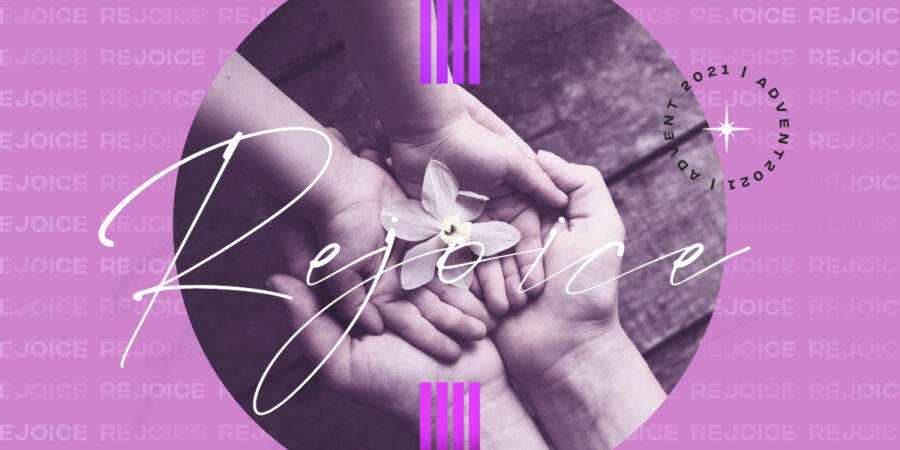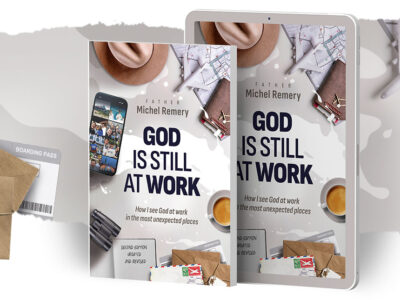Love God and neighbour
Third Sunday of Advent: 12 December 2021
Bible texts: Zep 3:14-18a | Isaiah 12:2-3, 4, 5-6 | Philippians 4:4-7 | Luke 3:10-18
King of Israel
Old and New Testament texts agree there is great cause for joy! In the Old Testament this joy is announced to the ‘Daughter of Zion’ and the ‘Daughter of Jerusalem’, which are synonyms for the people of Israel. The New Testament explains that Jesus has come to gather the new Israel, which includes all of us followers of Jesus (Gal 3:29). The prophet Zephaniah prophesied about the coming of the ‘King of Israel’ (Zep 3:15). Later, the wise Nathaniel recognised that this King of Israel is no-one else than Jesus (Jn 1:49). He is the Saviour or Messiah who had been announced by generations of prophets, and who is near now. Jesus will save the people from the consequences of their sins. Therefore Isaiah tells us: ‘With joy you will draw water at the fountain of salvation’ (Is 12:3).
Rejoice!
Zephaniah gives us many reasons for joy: the Lord is in our midst, he loves us, he wants to save us, he even exults over us, simple creatures! (Zeph 3:17). God loves you just the way you are and is very happy with you (but not always with the way you behave). Therefore, Zephaniah says that he sings joyfully because of you! You can think of his singing as being comforting like that of a mother singing a lullaby to her child, as a great hymn of thanksgiving, or as joyful singing at a party. We too are called to sing (Is 12:5-6). Often, in the Bible, singing is connected to rejoicing in the Lord, to praising him. Thus also Saint Paul calls us repeatedly to rejoice, for the Lord is near! (Phil 4:4-5).
What should I do?
In the Gospel we hear the answer to a very important question, which we all ask at one point: ‘What should we do?’ (Lk 3:10). The first answer is to care for others and to share what you have with those in need. You are called to do so generously, but not necessarily like Saint Francis who gave everything away, including the clothes on his body. When you have two coats, you can give away one, or else you would be in great need yourself. It depends on your vocation how you live this commandment of charity. People of various backgrounds come to ask John what they should do. His answer can be applied to your situation as well: be honest, be satisfied with what you have, and share with care for your neighbour. You are not the centre of the universe, God is!
Two principles
You might think that such altruistic teaching would draw people away. But the contrary is true. Throughout the ages people felt attracted to this message, presented in words they can understand. And it is still attractive today, otherwise you would not be reading this! The fundamental principle John teaches is to focus not on your own wellbeing but on that of everyone, the common good. His listeners find his message so attractive, that they confound the messenger with the one who sent him. John then makes it clear that he is announcing the coming of Jesus Christ, while also underlining his own unworthiness. Thus John passes on another fundamental principle: that of living not for your own honour but for the honour of God! He gives a great testimony of how to be a good Christian. Jesus later will refer to the double commandment of love for God and for other people (Mt 22:37-39).
Social justice
God’s order as outlined by John and explained by Jesus is applicable to the situation of everyone. You may be surprised that John does not call the tax collectors to stop collecting taxes, nor does he tell the soldiers to lay down their arms. Both professions are needed in the society we live in currently. But when he tells them to live honourably, also in their professional life, John is calling for social justice. Like the tax collectors and soldiers, you too will need to ask yourself what you should do and what you might have to give up to live a virtuous life. The social teaching of the Church wants to help you do so. You can read more about this in the book Your neighbour is GOD.
Repent
John’s words take a dramatic turn when he announces that ‘the chaff he will burn’ (Lk 3:17). God and sin are opposites. To come to God we need to be purified from all that is wrong, evil, and sinful. Remember, we will be judged by our deeds, our way of life (Mt 25:31-46). John is calling us to ‘repent’. He explains what this means with practical examples to tax collectors and soldiers. The first place where our change of heart should be visible is in our relationship with our neighbour. It is not enough to speak beautiful words of repentance in your prayer, you will need to show it! Repentance often is not found in great deeds and dramatic conversion. Much more it is found in searching honesty and integrity in the ordinary things of life. If you can do these ordinary things with extraordinary love, you are on your way to becoming a saint! The Old Testament already taught that what the Lord truly asks of you is ‘to do justice, and to love good ness, and to walk humbly with your God’ (Micah 6:8).
How?
Having to take off someone’s sandals was considered a very humiliating task. But John feels he is not even worthy to do such a humble thing! (Lk 3:16). Why? He is close to Jesus, whom he has known all his life. He does not ask anything for himself, apart from being allowed to follow and serve Jesus. What an example for us! How would you apply this in your relationship with Jesus?
Do not fear!
An important theme in Scripture is the invitation: ‘Do not be afraid’ (Zeph 3:16). Listen how Saint Paul tells us: ‘Do not worry about anything’ (Phil 4:6). When you truly rejoice with all your heart there is no place for fear or worry. So let go of these! This also means to stop worrying about your social standing or what people may think about you. Once you manage to see yourself the way God sees you, you will recognise that you are good the way you are. Do you want to see yourself like this?
Be strong!
But that does not mean that we can be idle. On the contrary. Look at the words of the prophet: ‘Do not let your hands grow weak’ (Zeph 3:16). Indeed, he tells us that we should not allow fear to make us weak. But in the light of Jesus’ message and example, it also is a reminder that we need to be strong in helping the poor and needy. God needs you to be his hands in reaching out to them, so do not let your hands grow weak! How can you make this call to charity concrete in your own life during this season of Advent?




